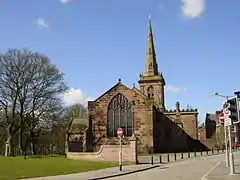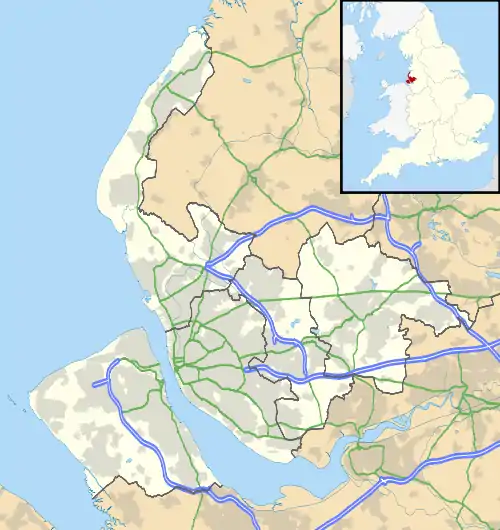Prescot
Prescot is a town and civil parish within the Metropolitan Borough of Knowsley in Merseyside, England. Historically part of Lancashire, it lies about eight miles (13 km) to the east of Liverpool city centre. At the 2001 Census, the civil parish population was 11,184 (5,265 males, 5,919 females).[1] The population of the larger Prescot East and West wards at the 2011 census totalled 14,139.[2][3] Prescot marks the beginning of the A58 road which runs through to Wetherby, near Leeds in West Yorkshire. The town is served by Prescot railway station and Eccleston Park railway station.
| Prescot | |
|---|---|
| Town | |
 St Mary's Church, Prescot | |
 Prescot Location within Merseyside | |
| Population | 11,184 (2001 Census)[1] |
| OS grid reference | SJ4692 |
| Civil parish |
|
| Metropolitan borough | |
| Metropolitan county | |
| Region | |
| Country | England |
| Sovereign state | United Kingdom |
| Post town | PRESCOT |
| Postcode district | L34/L35 |
| Dialling code | 0151 |
| Police | Merseyside |
| Fire | Merseyside |
| Ambulance | North West |
| UK Parliament | |
History
Prescot's name is believed to be derived from the Anglo-Saxon prēost "priest" + cot "cot", meaning a cottage or small house owned or inhabited by a priest, a "priest-cottage". (ME prest, preste, priest, OE prēost, LL presbyter, Gk πρεσβύτερος presbýteros "elder, priest").[4]
In the 14th century, William Dacre, 2nd Baron Dacre, obtained a charter for the holding of a three-day market and moveable fair at Prescot, to begin on the Wednesday following Corpus Christi.[5]
From the mid-1590s to 1609, Prescot was home to the Prescot Playhouse, a purpose-built Shakespearean theatre, probably located on Eccleston Street.[6] In the sixteenth century it was a small town of about 400 inhabitants, and not much bigger by the late seventeenth century.[7]
During the 18th and 19th centuries it was at the centre of the watch and clock making industry. This ended with the failure of the Lancashire Watch Company in 1910. In later years the BICC company was the primary industrial employer in the town. BICC ceased operations in Prescot in the early 1990s before the site was demolished and later cleared. The land remained desolate until the year 2000 when it was then regenerated into what is now known as Cables Retail Park, the name of which is a reference to the BICC and the history of the site on which it was built.[8]
Governance
Prescot has historically lain within the historic county of Lancashire. The town was contained in the Prescot Urban District in the administrative county Lancashire from 1894. When the administrative counties were abolished in 1974 the district became part of the Metropolitan Borough of Knowsley in the metropolitan county of Merseyside. It is currently served by Prescot Town Council.
Churches
The centre of Prescot has seven churches. Dominating the skyline is the 17th-century Prescot Parish Church of St Mary's. Tucked away behind St Mary's is the Roman Catholic Church of Our Lady and St Joseph. Prescot Methodist Church celebrated its 100th anniversary in 2009, but the building has since been shut down indefinitely. The congregation continues to exist, however, meeting in the adjacent church hall, known as Prescot Methodist Centre. Also in the town are a Salvation Army church, an Elim Pentecostal church (Prescot Community Church), a Plymouth Brethren Gospel Hall and the Zion Independent Methodist Church. Outside the centre, in the Portico area of the town is the Catholic Our Lady Help of Christians Church.
Places of worship shut down or moved over the past 20 years include the United Reformed church, the Kingdom Hall (Jehovah's Witnesses) and an independent charismatic church called simply Prescot Christian Fellowship.
Tourism, leisure and places of interest
Prescot Museum houses a permanent exhibition about the history of clock- and watch-making in the town, and several temporary exhibitions per year. The Georgian building is now also home to Knowsley Council's Arts and Events Service.
On the edge of the town is the famous estate of Lord Derby, which includes Knowsley Safari Park.
In recent years, a number of cultural and arts events have been established in the town, including the annual 10-day Prescot Festival of Music and the Arts and an annual Elizabethan Fayre.
The Shakespeare North Trust promotes William Shakespeare's historic connection with the town, a subject being researched at Liverpool's John Moores University. Inspired by the historic Prescot Playhouse, the Trust plans to build the Shakespeare North complex in Prescot, including a Shakespearean playhouse and an educational centre.[9] In April 2016, Knowsley Council granted planning permission for the new playhouse.[10]
Stone Street,(53°25′45″N 2°48′17″W) running between High Street and Eccleston Street, is just 26 inches wide at its southern end and is one of the narrowest streets in Britain.
Sport
The area's local football team Prescot Cables currently play in the Northern Premier League Division One at Valerie Park. Prescot & Odyssey Cricket Club is located near Knowsley Safari Park.
Historic estates
The estate of Parr[11] was within the ancient ecclesiastical parish of Prescot in modern-day Parr, St Helens. This was the original seat of the Parr family, of which Queen Katherine Parr, the last wife of King Henry VIII, was a member.
Notable residents
- Former Everton manager Dick Molyneux; who won Everton's first League Title was born in Prescot.
- Screenwriter Peter Briggs who wrote the film Hellboy, was born in neighbouring Whiston and grew up in Prescot.
- Actor Daniel Craig (James Bond 007), spent at least part of his childhood growing up in Prescot.
- Actress Sue Johnston (Brookside, The Royle Family); born in Warrington, grew up in Prescot.[9]
- Actress Christine Kavanagh (Seaforth, The Glass Virgin); was born in Prescot.
- Shakespearean actor John Philip Kemble was born in Prescot.[9] His house has since been demolished, but the road has been renamed Kemble Street. The John Kemble pub stands on this street in his memory.
- Actor Sam Kelly (Porridge, The Two Ronnies, All or Nothing, 'Allo 'Allo!).
- Nonsense-poet and artist Edward Lear.
- Former Huddersfield Town player Billy Mercer; started his career at Prescot Cables and won 2 First Division titles and appeared in an FA Cup final for Huddersfield Town.
- Former Bolton Wanderers player Derek Hennin; was born in Prescot and won the FA Cup in 1958 with Bolton Wanderers.
- Classical pianist Paul Lewis, who featured as a soloist at the 2005 Last Night of the Proms, was a student at Prescot Grammar School..
- Dave McCabe – Lead singer of the Merseyside band the Zutons.
- Danny McCall, former Brookside actor and star of West-End hit The Sound of Fury, based on the life of Billy Fury.
- Australian politician Jeanette Powell; born in Prescot, emigrated as a child.[12]
- Nigel Roberts, computer scientist and early Internet pioneer attended Prescot Grammar School.
- Singer/songwriter Lally Stott most famous for the hit single Chirpy Chirpy Cheep Cheep.
- Stuart Sutcliffe, early member of the Beatles attended Prescot Grammar School.
- Organist Professor Ian Tracey of Liverpool Anglican Cathedral.
- Professor Sid Watkins, world-renowned neurosurgeon who served twenty-six years as the FIA Formula One Safety Delegate and Medical Delegate, head of the Formula One on-track medical team, and first responder in case of a crash.
- Former Everton player Mark Ward; lived in Prescot at time of arrest.
- Former Hollyoaks actress Stephanie Davis.
- Reverend Arthur Herbert Procter, Victoria Cross recipient, was Curate at St Mary's Church from 1927 to 1931.[13]
- Electrical engineer, scientist and entrepreneur Professor Peter Lawrenson was born in Prescot.
References
- 2001 Census: Prescot, Office for National Statistics, retrieved 26 May 2008
- "Prescot East Ward population 2011". Retrieved 11 January 2016.
- "Prescot West Ward population 2011". Retrieved 11 January 2015.
- Prescot Origins and History, Knowsley Metropolitan Borough Council, retrieved 29 December 2005
- Edward Baines, William Robert Whatton, Brooke Herford, James Croston, The history of the county palatine and duchy of Lancaster, vol. 5 (J. Heywood, 1893), p. 2
- Graham, Elspeth; Tyler, Rosemary (2011). ""So Unbridled & Badde an Handfull of England": The Social and Cultural Ecology of the Elizabethan Playhouse in Prescot". In Benbough-Jackson, Mike; Davies, Sam (eds.). Merseyside: Culture and Place. Newcastle: Cambridge Scholars Publishing. pp. 109–139. ISBN 1-4438-2964-1.
- Steel, Thomas (2002). Prescot Churchwardens' Accounts. Record Society of Lancashire and Cheshire. pp. xii. ISBN 0 902593 48 X.
- BICC was Prescot, Prescot was BICC, archived from the original on 21 July 2006, retrieved 9 June 2006
- Paton, Maureen (26 March 2007), "Shakespeare's Globe goes North", The Daily Telegraph, London, retrieved 26 April 2016
- Snow, Georgia (22 April 2016). "£19m Merseyside Shakespeare theatre gets green light". The Stage. Retrieved 26 April 2016.
- G. E. Cokayne, The Complete Peerage, n.s., Vol.IX, p. 669
- biographic detail at vic.gov.au
- Crockfords Clerical Directory for 1931 OUP (1931) p1059
External links
| Wikimedia Commons has media related to Prescot. |
| Wikisource has the text of the 1911 Encyclopædia Britannica article Prescot. |
- Liverpool Street Gallery – Liverpool 34
- Arts in Prescot News about arts and entertainment in the area, including the Annual Prescot Festival of Music and the Arts
- Historical Archives Local government collection of pictures, photos and information about the town
- The Prescotian Site for alumni of the historic Prescot Grammar School
- Prescot Parish Church
- Prescot Roll of Honour Web site dedicated to the commemoration of the men of Prescot who gave their lives in the Great War 1914–1919
- Prescot History in Films A collection of Films Old & New depicting Prescot through the ages.